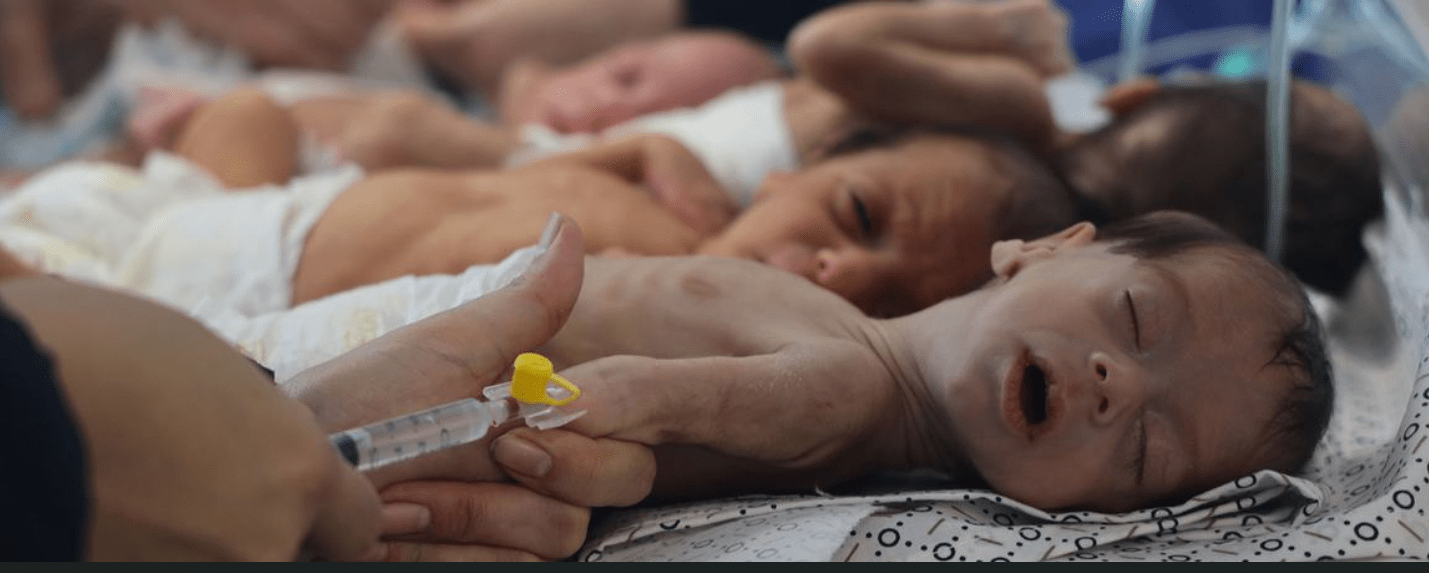A senior official with the UN Children’s Fund (UNICEF) has appealed for wider and safer humanitarian access in Gaza, where malnourished babies are slowly dying while the world watches.
“The child deaths we feared are here,” Adele Khodr, UNICEF Regional Director for the Middle East and North Africa, said in a statement issued on Sunday.
At least 10 children have died from dehydration and malnutrition at Kamal Adwan Hospital in the north in recent days, according to reports.

Helplessness and despair
Ms. Khodr warned that “there are likely more children fighting for their lives” in one of the few remaining hospitals in the enclave, and perhaps even more in the north who cannot access care at all.
She said parents and doctors must feel an unbearable sense of helplessness and despair when they realize that lifesaving aid is being kept out of reach, even though it is just a few kilometres away.
“But worse still are the anguished cries of those babies slowly perishing under the world’s gaze,” she said.
“The lives of thousands more babies and children depend on urgent action being taken now.”
Concern for northern Gaza
UNICEF fears more children will die unless the war ends and barriers to humanitarian relief are immediately resolved.
Ms. Khodr said the widespread lack of nutritious food, safe water and medical services, is a direct consequence of the impediments to access and multiple dangers facing UN humanitarian operations.
The situation is impacting children and mothers, hindering their ability to breastfeed their babies. This is especially the case in northern Gaza, where people are hungry, exhausted, and traumatized, with many clinging to life.
Aid restrictions ‘costing lives’
“The disparity in conditions in the north and south is clear evidence that aid restrictions in the north are costing lives,” she said.
UNICEF and the UN World Food Programme (WFP) conducted malnutrition screenings in the north in January. Teams found that nearly 16 per cent of children aged two and under, one in six, are acutely malnourished.
Similar screenings conducted in the south in Rafah, where aid has been more available, showed that five per cent of children in this age group are acutely malnourished.
Avert famine, save lives
“Humanitarian aid agencies like UNICEF must be enabled to reverse the humanitarian crisis, prevent a famine, and save children’s lives,” Ms. Khodr said.
“For this we need reliable multiple entry points that would allow us to bring aid in from all possible crossings, including to northern Gaza; and security assurances and unimpeded passage to distribute aid, at scale, across Gaza, with no denials, delays and access impediments.”
She recalled that UNICEF has been sounding the alarm since October that the death toll in Gaza would increase exponentially if a humanitarian crisis emerged and was left to fester.
The situation has only worsened, and last week the agency warned that an explosion in child deaths was imminent if the burgeoning nutrition crisis was not resolved.
“Now, the child deaths we feared are here and are likely to rapidly increase unless the war ends and obstacles to humanitarian relief are immediately resolved,” she said.
Statement by Adele Khodr, UNICEF Regional Director for the Middle East and North Africa on malnourished babies in Gaza slowly perishing under the world’s gaze
AMMAN, 3 March 2024 – “The child deaths we feared are here, as malnutrition ravages the Gaza Strip.
“At least ten children have reportedly died because of dehydration and malnutrition in Kamal Adwan Hospital in the Northern Gaza Strip in recent days. There are likely more children fighting for their lives somewhere in one of Gaza’s few remaining hospitals, and likely even more children in the north unable to obtain care at all.
“These tragic and horrific deaths are man-made, predictable and entirely preventable.
“The widespread lack of nutritious food, clean water and medical services, a direct consequence of the impediments to access and multiple dangers facing UN humanitarian operations, is impacting children and mothers, hindering their ability to breastfeed their babies, especially in the Northern Gaza Strip. People are hungry, exhausted and traumatized. Many are clinging to life.
“The disparity in conditions between the north and south is clear evidence that aid restrictions in the north are costing lives. UNICEF and WFP malnutrition screenings in the north in January found that nearly 16 per cent – or 1 in 6 children under 2 years of age – are acutely malnourished. Similar screenings conducted in the south in Rafah, where aid has been more available, found 5 per cent of children under 2 years are acutely malnourished.
“Humanitarian aid agencies like UNICEF must be enabled to reverse the humanitarian crisis, prevent a famine, and save children’s lives. For this we need multiple reliable entry points that would allow us to bring aid in from all possible crossings, including to northern Gaza; and security assurances and unimpeded passage to distribute aid, at scale, across Gaza, with no denials, delays and access impediments.
“UNICEF has been warning since October that the death toll in Gaza would increase exponentially if a humanitarian crisis emerged and was left to fester. The situation has only gotten worse, and as a result, last week, we warned that an explosion in child deaths was imminent if the burgeoning nutrition crisis wasn’t resolved.
“Now, the child deaths we feared are here and are likely to rapidly increase unless the war ends and obstacles to humanitarian relief are immediately resolved.
“The sense of helplessness and despair among parents and doctors in realizing that lifesaving aid, just a few kilometres away, is being kept out of reach, must be as unbearable, but worse still are the anguished cries of those babies slowly perishing under the world’s gaze. The lives of thousands more babies and children depend on urgent action being taken now.”
